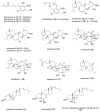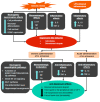Therapeutic Potential of Hericium erinaceus for Depressive Disorder
- PMID: 31881712
- PMCID: PMC6982118
- DOI: 10.3390/ijms21010163
Therapeutic Potential of Hericium erinaceus for Depressive Disorder
Abstract
Depression is a common and severe neuropsychiatric disorder that is one of the leading causes of global disease burden. Although various anti-depressants are currently available, their efficacies are barely adequate and many have side effects. Hericium erinaceus, also known as Lion's mane mushroom, has been shown to have various health benefits, including antioxidative, antidiabetic, anticancer, anti-inflammatory, antimicrobial, antihyperglycemic, and hypolipidemic effects. It has been used to treat cognitive impairment, Parkinson's disease, and Alzheimer's disease. Bioactive compounds extracted from the mycelia and fruiting bodies of H. erinaceus have been found to promote the expression of neurotrophic factors that are associated with cell proliferation such as nerve growth factors. Although antidepressant effects of H. erinaceus have not been validated and compared to the conventional antidepressants, based on the neurotrophic and neurogenic pathophysiology of depression, H. erinaceus may be a potential alternative medicine for the treatment of depression. This article critically reviews the current literature on the potential benefits of H. erinaceus as a treatment for depressive disorder as well as its mechanisms underlying the antidepressant-like activities.
Keywords: Hericium erinaceus; Lion’s mane mushroom; antidepressant; depression; mood disorders.
Conflict of interest statement
All authors declare no conflict of interest.
Figures




References
-
- World Health Organization Depression 2018. [(accessed on 10 July 2019)]; Available online: https://www.who.int/news-room/fact-sheets/detail/depression.
-
- McMahon F.J., Buervenich S., Charney D., Lipsky R., Rush A.J., Wilson A.F., Sorant A.J.M., Papanicolaou G.J., Laje G., Fava M., et al. Variation in the gene encoding the serotonin 2A receptor is associated with outcome of antidepressant treatment. Am. J. Hum. Genet. 2006;78:804–814. doi: 10.1086/503820. - DOI - PMC - PubMed
Publication types
MeSH terms
Substances
Grants and funding
LinkOut - more resources
Full Text Sources
Other Literature Sources
Medical

